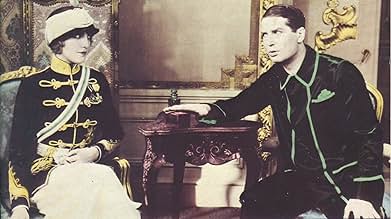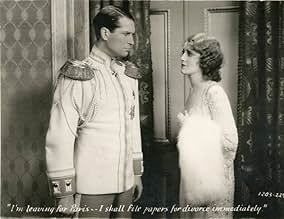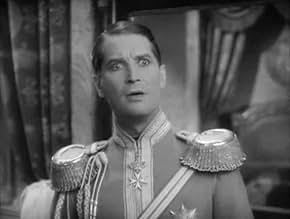IMDb-BEWERTUNG
7,0/10
2779
IHRE BEWERTUNG
Die Königin des mythischen Sylvania heiratet einen Höfling, der sein neues Leben als unbefriedigend empfindet.Die Königin des mythischen Sylvania heiratet einen Höfling, der sein neues Leben als unbefriedigend empfindet.Die Königin des mythischen Sylvania heiratet einen Höfling, der sein neues Leben als unbefriedigend empfindet.
- Für 6 Oscars nominiert
- 4 Gewinne & 6 Nominierungen insgesamt
Carl Stockdale
- The Admiral
- (as Carlton Stockdale)
Albert De Winton
- Cabinet Minister
- (as Albert de Winton)
Empfohlene Bewertungen
THE LOVE PARADE (Paramount, 1929) directed by Ernst Lubitsch, stars Maurice Chevalier in his second Hollywood musical (the first being 1929s "Innocents of Paris") and his first of four opposite Jeanette MacDonald in her screen debut. Jeanette plays Queen Louise of the Kingdom of Sylvania who immediately falls in love with Count Alfred Renard, a popular ladies' man, and soon marries this Parisian emissary in order to negotiate a loan from foreign power. After they wed, Alfred soon finds married life isn't what he has hoped, having to take orders from his wife as well as being second fiddle around the kingdom.
In spite of its age, THE LOVE PARADE is still quite entertaining early sound musical, consisted mostly of songs and limited dancing. With score composed by Victor Schewrtzinger and Clifford Grey, songs include, "Oo-La-La-La-La" (sung by Lupino Lane); "Paris, Stay the Same" (sung by Maurice Chevalier); "Dream Lover" (sung by Jeanette MacDonald/ ladies-in-waiting); "Anything to Please the Queen" and "My Love Parade" both sung by Chevalier and MacDonald); "Dream Lover" (reprise by MacDonald); "Let's Be Common" (sung by Lupino Lane and Lillian Roth); "The March of the Grenadiers" (sung by MacDonald); "Nobody's Using It Now" (sung by Chevalier); "The Queen is Always Right" (recited by Roth and Lane/ staff); "Dream Lover" (reprise by MacDonald); "March of the Grenadiers" (reprise by soldiers); and "My Love Parade" (reprised by MacDonald and Chevalier).
Running ten minutes shy of two hours, THE LOVE PARADE was nominated for an Academy Award as Best Picture, with Chevalier's nomination for Best Actor, but no wins. Other members of the cast consist of Eugene Palette, Edgar Norton, Ethel Griffies and Lionel Bellmore. Look fast for silent comic Ben Turpin in a funny bit; and future film stars as Virginia Bruce as the lady-in-waiting, and Jean Harlow as one of the patrons in the ballet theater.
Formerly presented on the American Movie Classics cable channel (January 1989-September 1996), AMC's host, Bob Dorian, noted an interesting piece of trivia that THE LOVE PARADE was the only movie in which Jeanette MacDonald smoked a cigarette on screen. Finally distributed to DVD in 2009, THE LOVE PARADE returned to cable television broadcasting once again, being Turner Classic Movies where it premiered February 3, 2010, with added bonus of two minute exit music in its fadeout.
Full of comedy wit and unexpected surprises in the Ernst Lubitch tradition, THE LOVE PARADE is still worthy film study and entertainment value after all these years. (***)
In spite of its age, THE LOVE PARADE is still quite entertaining early sound musical, consisted mostly of songs and limited dancing. With score composed by Victor Schewrtzinger and Clifford Grey, songs include, "Oo-La-La-La-La" (sung by Lupino Lane); "Paris, Stay the Same" (sung by Maurice Chevalier); "Dream Lover" (sung by Jeanette MacDonald/ ladies-in-waiting); "Anything to Please the Queen" and "My Love Parade" both sung by Chevalier and MacDonald); "Dream Lover" (reprise by MacDonald); "Let's Be Common" (sung by Lupino Lane and Lillian Roth); "The March of the Grenadiers" (sung by MacDonald); "Nobody's Using It Now" (sung by Chevalier); "The Queen is Always Right" (recited by Roth and Lane/ staff); "Dream Lover" (reprise by MacDonald); "March of the Grenadiers" (reprise by soldiers); and "My Love Parade" (reprised by MacDonald and Chevalier).
Running ten minutes shy of two hours, THE LOVE PARADE was nominated for an Academy Award as Best Picture, with Chevalier's nomination for Best Actor, but no wins. Other members of the cast consist of Eugene Palette, Edgar Norton, Ethel Griffies and Lionel Bellmore. Look fast for silent comic Ben Turpin in a funny bit; and future film stars as Virginia Bruce as the lady-in-waiting, and Jean Harlow as one of the patrons in the ballet theater.
Formerly presented on the American Movie Classics cable channel (January 1989-September 1996), AMC's host, Bob Dorian, noted an interesting piece of trivia that THE LOVE PARADE was the only movie in which Jeanette MacDonald smoked a cigarette on screen. Finally distributed to DVD in 2009, THE LOVE PARADE returned to cable television broadcasting once again, being Turner Classic Movies where it premiered February 3, 2010, with added bonus of two minute exit music in its fadeout.
Full of comedy wit and unexpected surprises in the Ernst Lubitch tradition, THE LOVE PARADE is still worthy film study and entertainment value after all these years. (***)
the sort of film that filmmakers to day are unable to make. it is too simple for them. it has a story with a beginning, middle and end. far too simple for the current crop of genius. the stars were real stars i swear they sometimes glittered. the directors famous touch was in fine form and even after many years i can remember walking home in a romantic glow. could anyone do the same after watching one of to days EPICS. i agree there must have been sound faults and other technical problems though i do not remember them. later on i heard a radio version also enjoyed. like far too many films of the past the love parade is unavailable to us on video or DVD. it may have been damaged and no longer usable though i do hope not. if there is any way to urge the current copyright owners to re-issue the film i would certainly like to be involved. are there other enthusiasts out there who agree?
This is very much like a Vienese operetta, with its principle couple - Chevalier and MacDonald - and its second couple, the help, who mirror the principle couple in a light way. The music often sounds like minor Johann Strauss or early Lehar, and the plot owes a lot to The Merry Widow.
Still, my favorite aspect of this movie is that, being pre-code, it constantly flirts with the edge of what could be dared in those days. It's never in any way obscene or vulgar, but it's constantly winking at the audience about matters sexual, and of course the last shot is of the couple in bed - one bed. Hollywood wouldn't enjoy that freedom for another 30 years.
It's all very light and, in the end, not very memorable, but along with One Hour with You, which I probably prefer, a very enjoyable way to spend an evening.
Still, my favorite aspect of this movie is that, being pre-code, it constantly flirts with the edge of what could be dared in those days. It's never in any way obscene or vulgar, but it's constantly winking at the audience about matters sexual, and of course the last shot is of the couple in bed - one bed. Hollywood wouldn't enjoy that freedom for another 30 years.
It's all very light and, in the end, not very memorable, but along with One Hour with You, which I probably prefer, a very enjoyable way to spend an evening.
Poor Queen Louise when she is awakened by her attendants she has been dreaming of love but must face another day in the Kingdom of Sylvania without a husband. When an errant military adjutant is recalled from Paris to face her censure she falls for his charms and he for hers, and they marry. But the Queen's new husband is unhappy in the role of obedient consort. Conflict arises but is eventually resolved, as we know it will be in operetta land.
This early Lubitsch musical rates about the same as MONTE CARLO made a year later. The highlight here is the performance of Maurice Chevalier as the consort, a sort of pre-Cary Grant Cary Grant, Gallic style. He has the same effortless magnetism and charm and a certain physical resemblance. Jeanette MacDonald is as good here as in MONTE CARLO, handling songs and dialogue with equal aplomb and looking gorgeous in her filmy gowns. As is usual with Lubitsch, there is a superior supporting cast, here including the formidable Lupino Lane as Chevalier's valet, a sassy and brassy Lillian Roth as Lane's love interest and Edgar Norton as the "Master of Ceremonies," the personification of royal lackey. Another Lubitsch hallmark, the measured depiction of ritualistic daily activities, gets much display in the context of the protocols of a royal palace. The songs by Victor Schertzinger and Clifford Grey are only passable and the primitive sound recording doesn't help in getting them across but the tone of the whole enterprise is so frothy and pleasant that one doesn't mind not hearing all of the lyrics.
When you compare this film to other musicals from the dawn of the sound era like Broadway MELODY the difference is glaring. Lubitsch's camera is liberated and fluid and we get an assortment of physical approaches to song and dance numbers which themselves vary in style from pompous operetta-military to musical hall slapstick to Gilbert-and- Sullivanesque call-and-repeat choral to intimate romantic duets. There is a hint of LOVE ME TONIGHT in some of the ensemble work, particularly with the palace staff. And the script is studded with witty observations and clever comic constructions, some via dialogue, some through pure visuals. THE LOVE PARADE illustrates that in 1929 Rouben Mamoulian (APPLAUSE) was not alone among film directors in recognizing the value of sound as an artistic element and in refusing to subordinate the freedom of the camera to the dictates of miking.
This early Lubitsch musical rates about the same as MONTE CARLO made a year later. The highlight here is the performance of Maurice Chevalier as the consort, a sort of pre-Cary Grant Cary Grant, Gallic style. He has the same effortless magnetism and charm and a certain physical resemblance. Jeanette MacDonald is as good here as in MONTE CARLO, handling songs and dialogue with equal aplomb and looking gorgeous in her filmy gowns. As is usual with Lubitsch, there is a superior supporting cast, here including the formidable Lupino Lane as Chevalier's valet, a sassy and brassy Lillian Roth as Lane's love interest and Edgar Norton as the "Master of Ceremonies," the personification of royal lackey. Another Lubitsch hallmark, the measured depiction of ritualistic daily activities, gets much display in the context of the protocols of a royal palace. The songs by Victor Schertzinger and Clifford Grey are only passable and the primitive sound recording doesn't help in getting them across but the tone of the whole enterprise is so frothy and pleasant that one doesn't mind not hearing all of the lyrics.
When you compare this film to other musicals from the dawn of the sound era like Broadway MELODY the difference is glaring. Lubitsch's camera is liberated and fluid and we get an assortment of physical approaches to song and dance numbers which themselves vary in style from pompous operetta-military to musical hall slapstick to Gilbert-and- Sullivanesque call-and-repeat choral to intimate romantic duets. There is a hint of LOVE ME TONIGHT in some of the ensemble work, particularly with the palace staff. And the script is studded with witty observations and clever comic constructions, some via dialogue, some through pure visuals. THE LOVE PARADE illustrates that in 1929 Rouben Mamoulian (APPLAUSE) was not alone among film directors in recognizing the value of sound as an artistic element and in refusing to subordinate the freedom of the camera to the dictates of miking.
Count Alfred (Maurice Chevalier) has disgraced his home country of Sylvania with one too many scandalous affairs with married women, and the ambassador of Sylvania commands him to return home. Alfred's manservant, Jacques (Lupino Lane), begs to come along, and his master relents. Alfred, burdened with a newly acquired French accent that makes him sound most un-Sylvanian, fears the wrath of his queen (Jeanette MacDonald). But instead of having him shot, she falls in love with him, and he with her. The entire kingdom, which has had nothing on its mind except seeing the queen get married, is thrilled. As Jacques and Lulu the maid (Lillian Roth) conduct their own romance, reveling in their commonness, Alfred discovers at the altar that his own marriage will be most uncommon - and a dire threat to his manhood. He may be marrying a queen, but he most definitely won't be a king.
Ernst Lubitsch directed this marvelous technical and artistic achievement back when other early sound films were still stumbling along. Four outstanding performances from four witty and charming performers (Chevalier, MacDonald, Lane and Roth) grace this lavishly produced musical comedy with its champagne-bubble songs and sexually-charged dialogue.
Ernst Lubitsch directed this marvelous technical and artistic achievement back when other early sound films were still stumbling along. Four outstanding performances from four witty and charming performers (Chevalier, MacDonald, Lane and Roth) grace this lavishly produced musical comedy with its champagne-bubble songs and sexually-charged dialogue.
Wusstest du schon
- WissenswertesConsidered by many to be the first musical film in which the songs were integrated with the story.
- PatzerThe fact that Count Alfred (Maurice Chevalier) speaks with a French accent, even though he is not supposed to be French, is really not an "error". However, by adding a scene to attempt to explain this anomaly, it only serves to highlight the accent discrepancies in the casting. For instance, in contrast to the accent discrepancy with Chevalier's character, no one seems to notice that his French servant, Jacques (Lupino Lane), speaks British English with no discernible French accent.
- Zitate
Queen Louise: Why am I always awakened from my dreams?
- Alternative VersionenThere is an Italian edition of this film on DVD, distributed by DNA Srl: "IL PRINCIPE CONSORTE (1929) + AMAMI STANOTTE (1932)" (2 Films on a single DVD), re-edited with the contribution of film historian Riccardo Cusin. This version is also available for streaming on some platforms.
- VerbindungenFeatured in Göttinnen der Liebe (1965)
Top-Auswahl
Melde dich zum Bewerten an und greife auf die Watchlist für personalisierte Empfehlungen zu.
- How long is The Love Parade?Powered by Alexa
Details
- Erscheinungsdatum
- Herkunftsland
- Sprachen
- Auch bekannt als
- The Love Parade
- Drehorte
- Produktionsfirma
- Weitere beteiligte Unternehmen bei IMDbPro anzeigen
Box Office
- Budget
- 650.000 $ (geschätzt)
- Laufzeit1 Stunde 47 Minuten
- Farbe
Zu dieser Seite beitragen
Bearbeitung vorschlagen oder fehlenden Inhalt hinzufügen


































